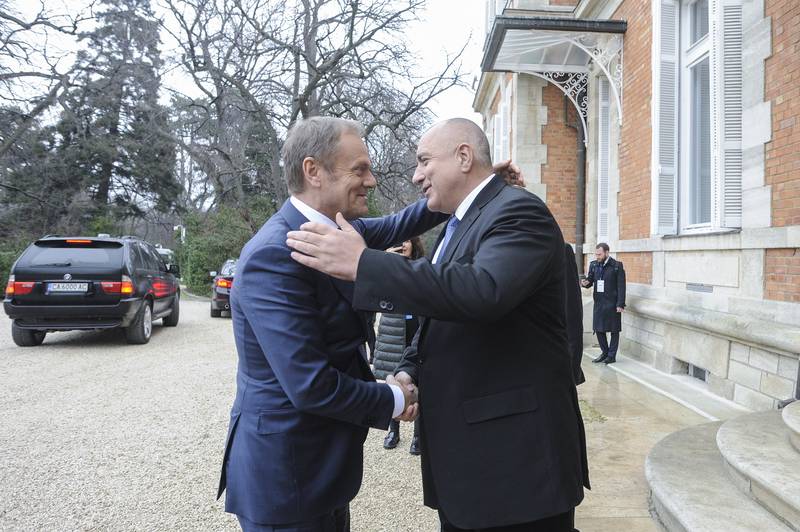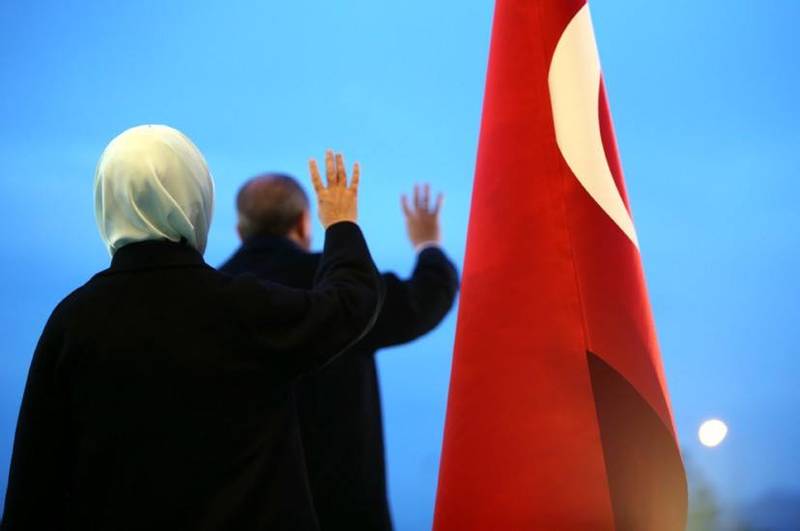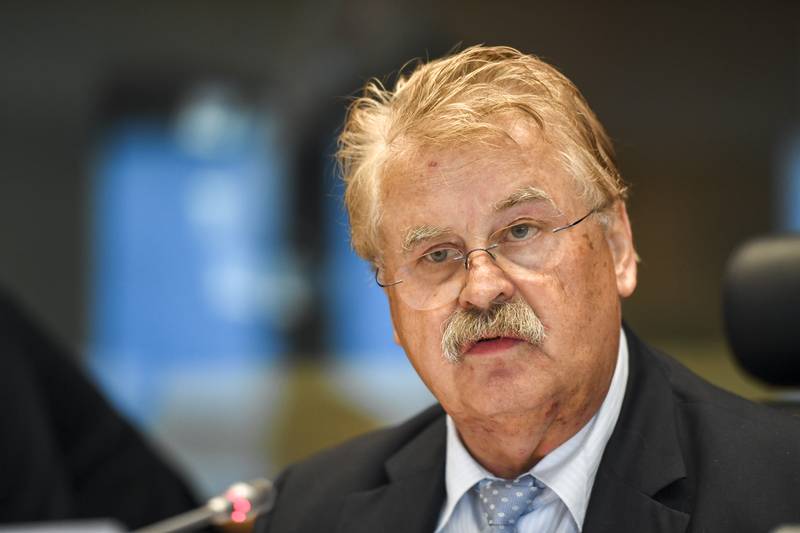The EP is About to Adopt a Critical Resolution on Turkey's Progress in 2011
Ralitsa Kovacheva, January 16, 2012
 Not respecting the fundamental rights and media freedom, as well as not solving the Cyprus issue are the main obstacles to Turkey's progress in its negotiations for full EU membership. This was clearly shown during the debate in the Committee on Foreign Affairs in the European Parliament on the report of Ria Oomen-Ruijten (EPP, the Netherlands), on the basis of which the Parliament must adopt a resolution on Turkey's progress in 2011. The report repeats many of the conclusions of last year's report, so the rapporteur underlined that she had
Not respecting the fundamental rights and media freedom, as well as not solving the Cyprus issue are the main obstacles to Turkey's progress in its negotiations for full EU membership. This was clearly shown during the debate in the Committee on Foreign Affairs in the European Parliament on the report of Ria Oomen-Ruijten (EPP, the Netherlands), on the basis of which the Parliament must adopt a resolution on Turkey's progress in 2011. The report repeats many of the conclusions of last year's report, so the rapporteur underlined that she had  attempted to identify only the main points, where it was most important to achieve progress. Ria Oomen-Ruijten, as well as many other lawmakers, supported the European Commission's decision to establish a new agenda for the EU-Turkey relations, considering the need to renew efforts to open new chapters in the negotiations.
attempted to identify only the main points, where it was most important to achieve progress. Ria Oomen-Ruijten, as well as many other lawmakers, supported the European Commission's decision to establish a new agenda for the EU-Turkey relations, considering the need to renew efforts to open new chapters in the negotiations.
The report "stresses the interdependence between the European Union and its Member States and Turkey; recognises the economic and growth potential of Turkey and its relevant role for energy security; underlines that such interdependence is complemented by the value of potential synergies between the Union's and Turkey's foreign and security policy and neighbourhood policy with benefits and reinforced leverage for both."
But:
"Believes, however, that such interdependence can only produce positive results if it is framed in a context of mutual commitment, strategic dialogue, delivery in the reform process and in the implementation of reforms, Turkey's good relations with neighbouring EU Member States and solid cooperation."
The tone of the discussions in the foreign affairs committee was very critical, especially against the background of the statements on the progress report on Serbia, which were discussed by the lawmakers previously. Moreover, the tone of many of the speeches was haughty, sometimes even ultimate. In the name of objectivity, though, it should be noted that MEPS from Greece and Cyprus were very active in the debate. Overall, MEPs were most critical regarding the respect of fundamental rights and freedom of media, as well as judicial reform. The lawmakers expressed full support for the conclusion of the European Commission 2011 report saying that "it remains essential that Turkey continues its reforms concerning the political criteria with the need for significant further efforts to guarantee fundamental rights."
Ria Oomen-Ruijten's report pays particular attention to the lack of guarantees for a fair trial and "the duration of pre-trial detention, with the latter becoming de-facto punishment without a trial." Many lawmakers focused their speeches on the anti-terrorist law, which they believed was misused by Turkish authorities. Hélène Flautre MEP (Greens/EFA Group, France) defined the law as totalitarian and called for independent oversight of the investigation, because of the use of excessive force by the police without any democratic control.
As for the criminal prosecutions against journalists, the EP "considers the criminalisation of opinions as a key obstacle to the protection of human rights in Turkey." The report defines as "very urgent" the legislative reform aimed to remove disproportionately high fines on media, "leading in some cases to their closure or to self-censorship by journalists or their editors”, as well as of the law limiting freedom of expression on the Internet.
Although the report states that Turkey's relations with neighbouring Member States as "a key factor in revamping negotiations and dialogue", Turkey was strongly criticised in this respect, especially on the Cyprus issue. The report says that "a fair and viable settlement of the Cyprus issue is now urgent", calling on Turkey " to begin withdrawing its forces from Cyprus and to transfer Famagusta to the United Nations," and Cyprus in turn "to open the port of Famagusta under EU customs supervision." The report notes that the refusal of Turkey to implement the so-called Ankara protocol (which provides for Turkey to open its airports and ports for the countries that joined the EU in 2004, including Cyprus), "continues to deeply affect the process of negotiations, and calls on the Turkish Government to implement the protocol in full without further delay."
Solving this dispute, however, seems more difficult, given the forthcoming Cyprus EU Presidency from July 2012. Turkey has already announced it will freeze its relations with the EU Presidency in the second half of the year. Bad relations between Turkey and Cyprus have implications beyond the bilateral relationship, so the report calls on Turkey "to allow for political dialogue between the EU and NATO by lifting its veto on EU-NATO cooperation including Cyprus and consequently calls on the Republic of Cyprus to lift its veto to the participation of Turkey to the European Defence Agency”.
 Especially critical on this point was British MEP Charles Tannock (Group of the European Conservatives and Reformists), who sharply criticised Turkey that it had deteriorated its relations with Israel, had not applied the Ankara protocol with respect to Cyprus, which Turkey "absurdly didn`t recognise as a sovereign state", that had closed its border with Armenia and refused to recognise Armenian genocide.
Especially critical on this point was British MEP Charles Tannock (Group of the European Conservatives and Reformists), who sharply criticised Turkey that it had deteriorated its relations with Israel, had not applied the Ankara protocol with respect to Cyprus, which Turkey "absurdly didn`t recognise as a sovereign state", that had closed its border with Armenia and refused to recognise Armenian genocide.
Nikolaos Salavrakos (Europe of Freedom and Democracy, Greece) said that Turkey should be reminded that it could not exist without the rest of the world, because sometimes Ankara behaved in a manner that did not respect the rights of others. Turkey has many obsessions, especially on the Cyprus issue, the MEP said, defining Ankara`s behaviour regarding the upcoming Cypriot Presidency as childish.
Regarding visas - an issue that is particularly sensitive for Turkey, the report notes that "Turkey is the only candidate country which does not have visa liberalisation", stressing "the importance of facilitating access to the European Union to business people, academics, students and representatives of civil society." To that end, Turkey should "sign and implement the EU-Turkey readmission agreement without further delay", as "once the readmission agreement enters into force, the Council should mandate the Commission to initiate the visa dialogue and define the roadmap." Another important condition is "intensifying cooperation between the EU and Turkey on migration management and border controls, inter alia in light of the large percentage of illegal immigrants entering EU territory via Turkey."
During the debate many MEPs noted the importance of Turkey as an economic partner of the EU. As the report notes, "Turkey's economy has tripled its size over the past decade and has grown almost 10% in the last year and is considered one of the seven largest emerging economies in the world [... ]; Trade between the European Union and Turkey totalled EUR 103 billion in 2010 with Turkey as the Union's seventh biggest trading partner and the Union as Turkey's biggest, with 80% of Foreign Direct Investment in Turkey coming from the European Union."
Many MEPs stressed the importance of the country as an energy corridor:"Turkey is the EU energy corridor for Caucasian and Caspian oil and gas resources and has strategic proximity to Iraq and its developing crude oil market." The legislators drew particular attention to the possibility of Turkey and the EU to cooperate in terms of the Arab spring: "Turkey, built on a solid secular State, could prove a
valuable example for democratising Arab States in completing their democratic transition and socio-economic reforms. [...] Structured dialogue between the EU and Turkey on the coordination of their respective foreign and neighbourhood policies could provide unique synergies," the report notes.
 In this regard, Italian MEP Mario Mauro (European People`s Party) noted: We cannot pretend that we do not see how Turkey is developing a new geopolitical, neo-Ottoman policy, which is an alternative to the European one. His party fellow José Ignacio Salafranca Sánchez-Neyra (Spain) added that the EP analysis of Turkey's progress should include the influence of public opinion, given the declining support for Turkish EU membership.
In this regard, Italian MEP Mario Mauro (European People`s Party) noted: We cannot pretend that we do not see how Turkey is developing a new geopolitical, neo-Ottoman policy, which is an alternative to the European one. His party fellow José Ignacio Salafranca Sánchez-Neyra (Spain) added that the EP analysis of Turkey's progress should include the influence of public opinion, given the declining support for Turkish EU membership.
Surprisingly, the last two comments were overlooked by lawmakers without provoking deeper discussion, although they are quite reasonable, given the signs coming from Ankara. During his visit to Germany last fall, Turkish President Abdullah Gul said: "I am of the conviction that the ongoing debates about whether Turkey should be a member of the EU are most inappropriate. What is to be done is to give Turkey the opportunity to conclude its negotiations process. I do not know but when that day comes, I and the Turkish people, we may say we do not want to join the EU." At the same time, the country is clearly willing to strengthen its role as regional leader in the Middle East and its Foreign Minister Ahmet Davutoglu speaks of a strategic alliance between Turkey and Egypt as „an axis of democracy of the two biggest nations in our region, from the north to the south, from the Black Sea down to the Nile Valley in Sudan." Against this background, the EU tone towards Turkey could be anything but ultimate.
In 2011, euinside, together with the European Institute for Strategy and Policies | ESPI and StratCom, organised a discussion called "Turkey and the EU: Formulas for a Common Future." Here you can see all the speeches (links to individual topics can be found under each article).
 Donald Tusk, Boyko Borissov | © Council of the EU
Donald Tusk, Boyko Borissov | © Council of the EU | © Turkey Presidency
| © Turkey Presidency Elmar Brok | © European Parliament
Elmar Brok | © European Parliament